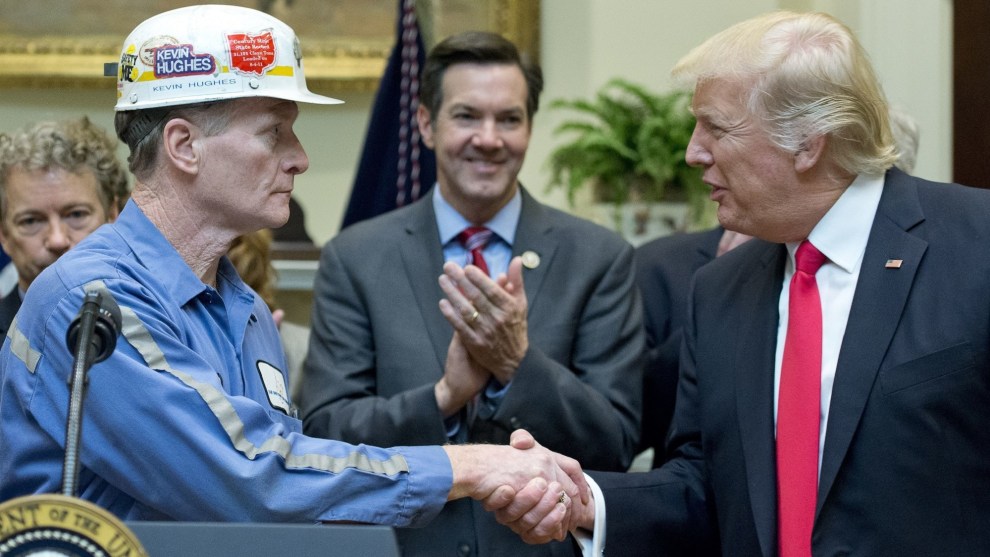
The claim that everyone is entitled to his or her day in court is supposed to be one of the bedrock principles of the U.S. legal system. This notion, as it applies to workplace abuses, took a big hit in the Supreme Court last year, and now the National Labor Relations Board is making matters worse.
In its controversial Epic Systems ruling in May 2018, the high court held that employers can compel their workers to sign agreements waiving their right to sue over issues such as wage theft and discrimination and limiting their redress to arbitration actions. Because these actions are individual rather than collective and are not part of the public record, arbitration makes it much easier for corporations to avoid paying out substantial damages for their misconduct.
The pro-business majority on the NLRB just pushed through a decision that gives employers an additional opportunity to implement a mandatory arbitration system. The board ruled that companies may impose such a system after a Fair Labor Standards Act collective action lawsuit has already been filed, in order to prevent additional employees from signing on to the suit.
The board also affirmed the right of an employer to discharge a worker who refuses to sign a mandatory arbitration agreement.
This patently unfair decision is another indication of the lengths that the corporations and their advocates will go to circumscribe the rights of workers. We should expect to see more of these moves, because the Epic Systems ruling has not yet put a major dent in class action lawsuits.
There has not been a significant decline in the number of cases filed, and there continues to be a steady stream of settlement announcements, especially for cases filed in California, which gives workers additional legal tools to deal with wage theft in particular.
Here are some recent examples of these settlements:
Wells Fargo agreed to pay $35 million to a group of 38,000 bank employees who alleged they were improperly denied overtime pay.
Kraft Heinz agreed to pay $3 million to settle a suit brought on behalf of 4,000 workers alleging that the company violated California labor law by failing to pay overtime.
The operator of hundreds of Panera Bread restaurants agreed to pay $4.6 million to settle allegations that it improperly classified assistant managers as executives to deny them overtime pay.
A group of drivers and their assistants who delivered Best Buy merchandise signed a $3.25 million deal to settle a lawsuit alleging they were misclassified as independent contractors and consequently shortchanged on pay.
A Massachusetts court gave preliminary approval to a $3.9 million settlement of a class action brought by former commission-only salespeople at the mattress retailer Sleepy’s who argued they should receive overtime pay.
If corporate interests get their way, these settlements will disappear, and workers who are cheated on the job will have to settle for the crumbs they may get through individual arbitration filings.

 For a long time, the corporation that stood out as America’s worst employer was Walmart, given its reputation for shortchanging workers on pay, engaging in discriminatory practices and ruthlessly fighting union organizing drives. Today, Amazon.com seems to be trying to take over that title, at least for its blue-collar workforce.
For a long time, the corporation that stood out as America’s worst employer was Walmart, given its reputation for shortchanging workers on pay, engaging in discriminatory practices and ruthlessly fighting union organizing drives. Today, Amazon.com seems to be trying to take over that title, at least for its blue-collar workforce. The bankruptcy filing, store closings and general uncertainty surrounding the future of Sears have prompted a spate of nostalgic business-page articles about the history of the once dominant retailer. Whether or not the chain survives, it is important not to sugarcoat its past.
The bankruptcy filing, store closings and general uncertainty surrounding the future of Sears have prompted a spate of nostalgic business-page articles about the history of the once dominant retailer. Whether or not the chain survives, it is important not to sugarcoat its past. The Trump Administration has left little doubt that one of its main missions is to roll back the regulatory initiatives of the Obama years, especially the Clean Power Plan and the Consumer Financial Protection Bureau. Although Trump has been less overt about it, his corporate-friendly approach also includes weakening rules that have been around for decades.
The Trump Administration has left little doubt that one of its main missions is to roll back the regulatory initiatives of the Obama years, especially the Clean Power Plan and the Consumer Financial Protection Bureau. Although Trump has been less overt about it, his corporate-friendly approach also includes weakening rules that have been around for decades. Donald Trump’s blue-collar supporters may like what they are seeing on Fox News, but when they arrive at work the MAGA revolution is nowhere to be found. Far from empowering labor, the Trump Administration’s employment policies are heavily skewed toward management.
Donald Trump’s blue-collar supporters may like what they are seeing on Fox News, but when they arrive at work the MAGA revolution is nowhere to be found. Far from empowering labor, the Trump Administration’s employment policies are heavily skewed toward management. For the past two decades, Walmart has repeatedly been accused of compelling workers to perform certain tasks off the clock and has paid numerous fines for those practices. It is often suggested that the retailer is an anomaly, acting more like a fly-by-night sweatshop than a corporate giant.
For the past two decades, Walmart has repeatedly been accused of compelling workers to perform certain tasks off the clock and has paid numerous fines for those practices. It is often suggested that the retailer is an anomaly, acting more like a fly-by-night sweatshop than a corporate giant.
 Donald Trump got a lot of mileage during his presidential campaign from criticizing the poor record of wage growth during the Obama era. Since taking office he has done nothing to directly address the issue. In fact, his administration’s attacks on labor rights have made it more difficult for workers to push for higher pay through unions.
Donald Trump got a lot of mileage during his presidential campaign from criticizing the poor record of wage growth during the Obama era. Since taking office he has done nothing to directly address the issue. In fact, his administration’s attacks on labor rights have made it more difficult for workers to push for higher pay through unions. Several weeks ago, in one of his few legislative successes, President Trump signed a bill rescinding the Obama Administration’s executive order on Fair Pay and Safe Workplaces. The order, designed to promote better employment practices by companies doing business with the federal government, instructed procurement officials to consider the labor track record of contractors, which were required to disclose their recent violations.
Several weeks ago, in one of his few legislative successes, President Trump signed a bill rescinding the Obama Administration’s executive order on Fair Pay and Safe Workplaces. The order, designed to promote better employment practices by companies doing business with the federal government, instructed procurement officials to consider the labor track record of contractors, which were required to disclose their recent violations.
You must be logged in to post a comment.